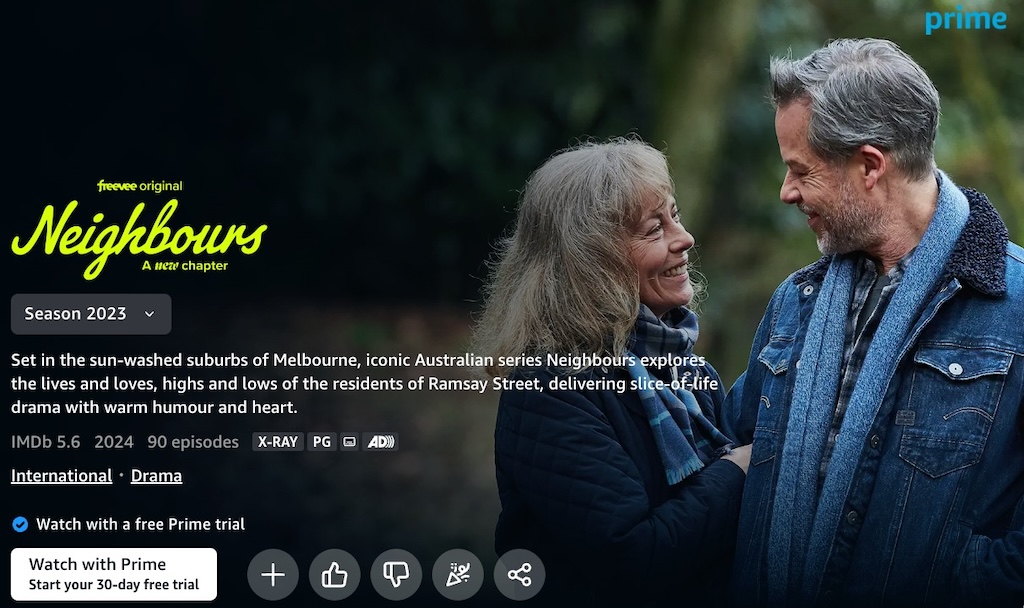During my last trip to Japan, I watched my Japanese sister-in-law flick through her Amazon Prime account, looking for something to watch.
When she opened the page for THE LEGEND & BUTTERFLY, I commented that it looks like Amazon has a localisation problem:

She looked puzzled and was not sure what I meant. If you are a Japanese speaker, can you see something that does not seem quite right?
Let’s see the English version as well, because it has the same problem:

The context here is that we are physically in Japan, using Amazon Prime’s Japanese site, to view information about a Japanese-language movie that was made in Japan, with a Japanese cast…
…And yet, the film is tagged as being “International” (or, more blatantly, a “foreign film”, as per “外国映画” [gaikoku eiga], the Japanese translation of the tag1).
No, Amazon, it is not an international film. From where we were sitting, it is about as local as you can get.
So, what is Amazon’s definition of “international” media? I am wagering you can already guess, but let’s go through the motions and do some searching anyway, for science!
Let’s start in the immediate area from Japan with Korean drama Death’s Game:

Looks like we are still in international waters. Let’s assume that Asia is out, and head to Europe: is Italian comedy series LOL: Chi ride è fuori international?

Sure is. Maybe Amazon thinks “international” means “language”…? Let’s try some English only titles. What does it say about long running Australian soap opera Neighbours?

Hmm…well, I guess Aussies can be hard to understand with our strange accents. Maybe Amazon means some English accents are international, and some not…? How about something from the United Kingdom, birthplace of English and home of Received Pronunciation? Let’s look at Father Brown:

*Gasp*! A show using the most English of Englishes is still considered to be “international”? How can this be…?
To the surprise of no one, I am sure, no media on Amazon Prime originating from the United States (at least that I have been able to find) is tagged as being “international”. This can be seen as a codification of Amazon’s identity as a US company: everything from the United States is “local” and everything from outside the United States is “international”. Amazon may currently operate on a global scale, but true to its origins, it still seems to keep that US-centric viewpoint, and that is reflected in its systems.
This is not necessarily a bad thing in and of itself. I think the issue is when you do this yet also tout your own localisation efforts publicly:
“When we think about launching in a new country, we really want to make sure that we bring a truly local feel to it. So, we’re trying to be very thoughtful when we enter a new region to make sure that we’re not only bringing all of these amazing global series and tentpoles, but that we really do it right, locally.”
I would posit that the Prime interface can probably do a bit better on the “truly local feel” aspect. To be fair, though, I did find titles from non-US countries on Amazon Prime that are not specifically tagged with “International”, but there is no way to know whether its absence is intentional, and indicative of some active effort to change.
Regardless, I think the solutions are to either:
- just remove the “International” tag altogether, because from a global standpoint, it is meaningless. I am sure that in the metadata of each piece of media is its “country of origin” and “spoken language”, and that is probably enough to cover “show me something foreign/different” use cases that viewers may have
- if it must still exist, have the “International” tag become a kind of virtual tag. Rather than be tied directly to media, relate it to a user and their location/language preferences etc, and only display it when they view content that is different to those preferences
This whole post may be about making a mountain out of a tag-shaped molehill that it seems most people do not notice or care about. But, it goes to show that internationalisation/localisation is hard, and even for huge companies with lots of resources like Amazon, there is always room for improvement.
-
Unfortunately, this Japanese translation itself is inappropriate, since it contains the word “film/movie” in it (“映画”), and the tag is also being applied to media that are not classified as films, like TV series. For artistic works, I would think that “海外作品” (kaigai sakuhin; overseas [artistic] works) is a better fit. ↩




Leave a comment